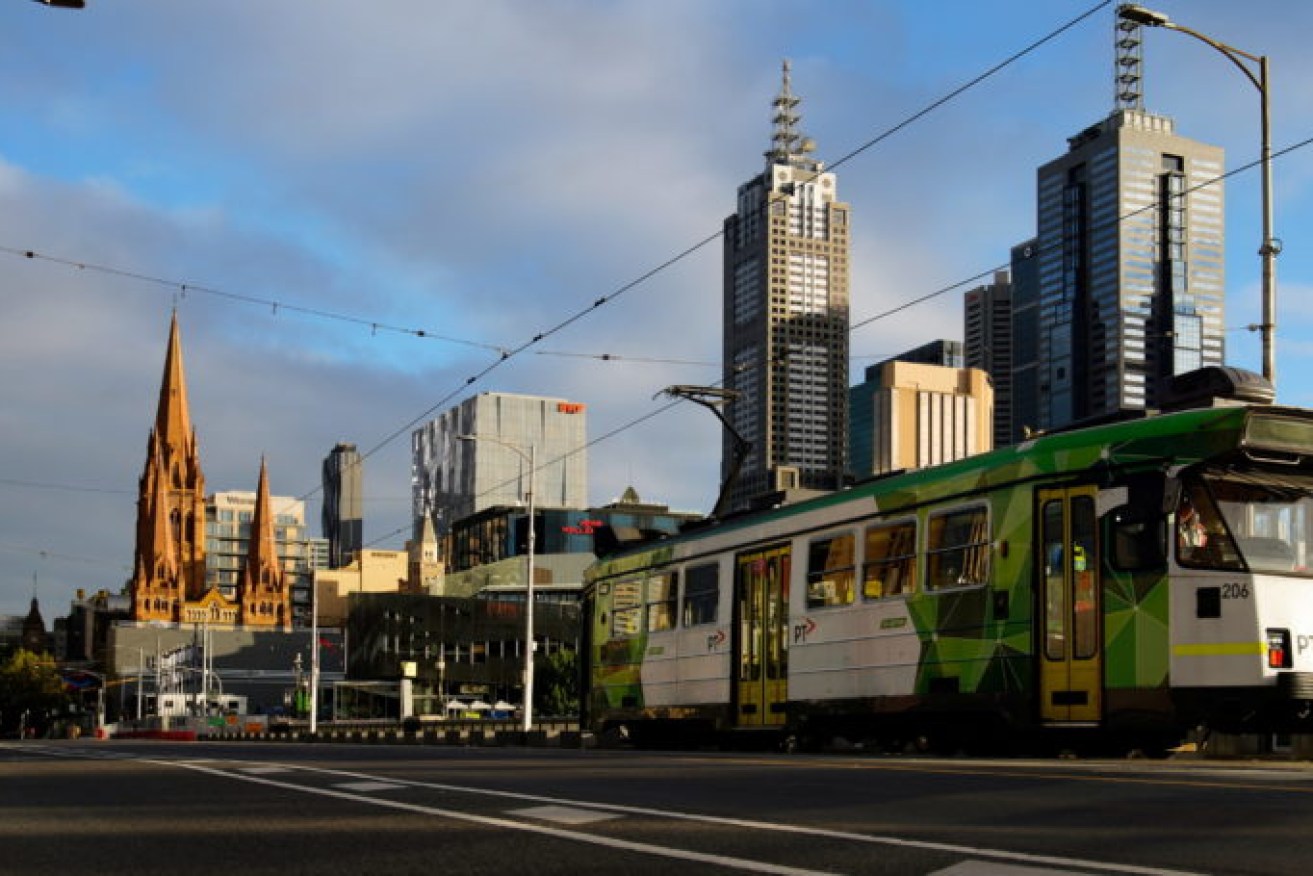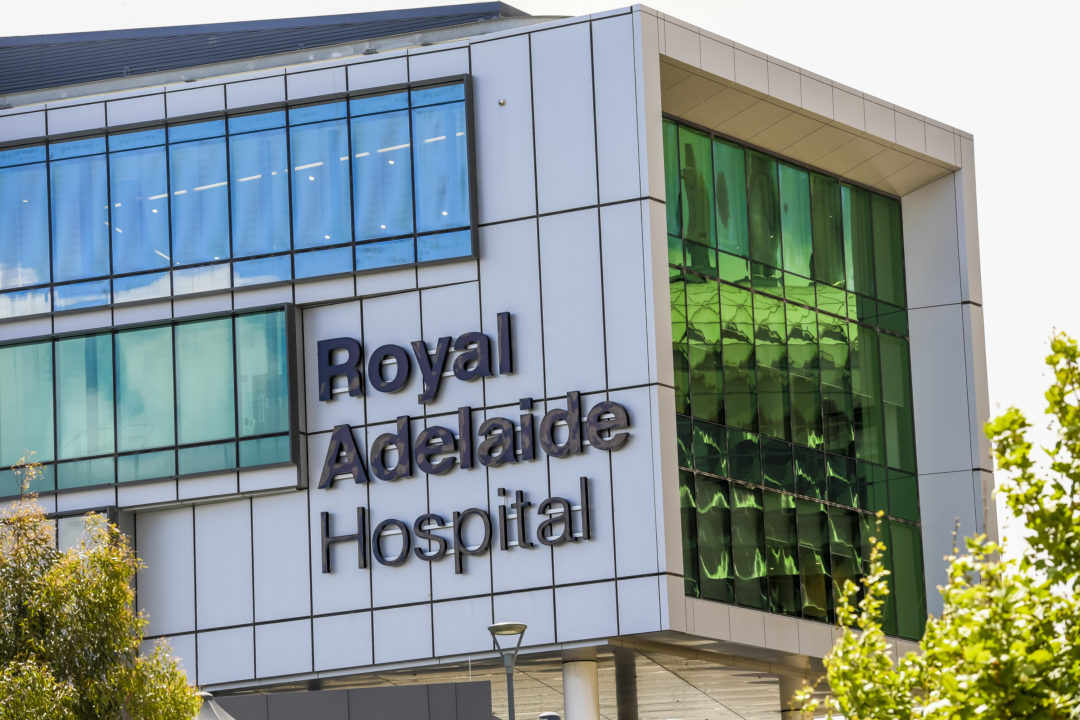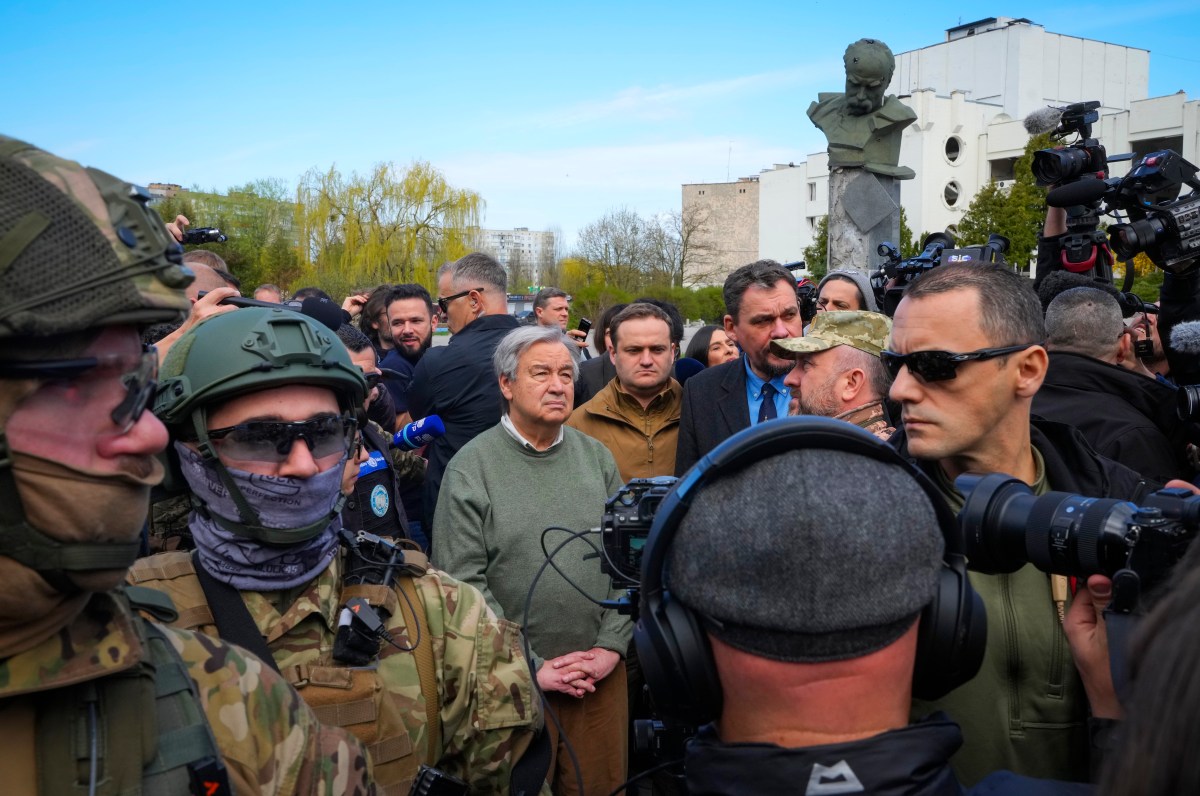What we know today, Friday April 29
Victoria’s COVID-19 lockdowns led to a spike in mental health service presentations across Australia, a parliamentary inquiry has been told.

An empty street in Melbourne during lockdown in February 2021. Photo: Sandra Sanders/Reuters
- Vic lockdown had nationwide mental health impact, inquiry told
- SA COVID hospitalisations drop
- SA Opposition Leader tests COVID-positive
- ICAC to begin ‘evaluation’ of major SA health network
- Close contact quarantine rules end tonight
- VIDEO: Woman targeted in carjacking attempt
- Blasts hit Kyiv during UN chief visit
- Albanese rejoins campaign amid cost of living debate
- SA ‘well-placed’ to be at centre of potential $3bn industry
Vic lockdown had nationwide mental health impact, inquiry told
Victoria’s COVID-19 lockdowns led to a spike in mental health service presentations across Australia, a parliamentary inquiry has been told.
The spike in mental health presentations weren’t as high as in Victoria, but there was an uplift in every state and territory, BeyondBlue’s chief executive Georgie Harmon told a Victorian parliamentary inquiry into the state’s pandemic orders.
“Every time there was a lockdown, regardless of where it was, we saw a spike,” Harmon said on Friday.
“If you think about it, we’re one country and people have families in other states. They were separated, they had travel plans interrupted, and there was just this rolling uncertainty of the future.”
In the days leading up to a lockdown, there was a 13.65 per cent rise in Victorians contacting BeyondBlue for counselling, while nationally that figure was about 14 per cent.
The review is looking at how the state’s COVID-19 lockdowns and restrictions affected residents’ mental health and wellbeing.
Harmon said by mid-2021, monthly demand for BeyondBlue’s services had risen by about 30 per cent, with the service receiving 128,000 calls and 13,000 counselling web chats nationally between April 2020 and March this year.
“Many experts believe the pandemic is similar to a natural disaster in that it has impacted a whole population and there has been a sense of enduring collective trauma,” Harmon said.
“Except, unlike the trauma that follows most disaster events which are over relatively quickly, this crisis has been drawn out.”
Suicide attempts and suicidal ideation presentations had risen in the state, although the suicide rate did not exceed pre-pandemic levels, Victoria’s chief psychiatrist told the inquiry.
The number of Victorians experiencing eating disorders also increased, although the rise was reflected nationally so it was hard to say whether lockdowns played a role, Dr Neil Coventry said.
While Coventry said he was not involved in the drafting of Victoria’s pandemic orders, he did provide relevant data to the chief health officer and health department.
Coventry said public health advice was complex and needed to factor in a range of issues, not just mental health.
“It’s never something that I would feel I would have the expertise to be saying, this is the right order,” he said on Friday.
“My concern is to make sure that people who make the orders are considering all the relevant factors.”
The inquiry is continuing on Friday afternoon, with Headspace chief executive Jason Trethowan among those due to give evidence.
Lifeline 13 11 14
beyondblue 1300 22 4636
SA COVID hospitalisations drop
South Australia has recorded three COVID-related deaths, 3924 cases and a drop in hospitalisations.
SA Health reported a short time ago that there are now 222 people in hospital with COVID-19, compared to 240 the day before.
Today’s 3924 cases are slightly up from the 3733 reported on Thursday. The level of PCR testing increased by less than one per cent over the last 24 hours.
A man in his 50s, a man in his 80s and a woman in her 80s are the latest to die with COVID-19 in SA.
There are 25,246 active cases across the state.
SA Opposition Leader tests COVID-positive
Newly-elected Liberal Party leader David Speirs is expected to miss his parliamentary debut as State Opposition Leader next week after testing positive to COVID-19.
Speirs is in isolation, releasing a statement last night saying he tested positive to a rapid antigen test yesterday after developing “mild symptoms”.
It comes just days before State Parliament resumes on Tuesday, meaning Speirs will miss his first sitting day as Opposition Leader.
“I am thankful that I feel fit and healthy, aside from a scratchy throat, but will now isolate for seven days in line with current SA Health rules,” Speirs said in a statement.
“I am in the process of communicating with everyone who I have met with over the past two days and encouraging them to get tested where appropriate.
“I will continue to work from home as my new Liberal leadership team starts to develop a positive alternative vision for the future of South Australia.”
Meanwhile, West Australian Premier Mark McGowan is set to re-emerge from COVID-19 isolation as the state winds back face mask and vaccination mandates.
The premier says he is feeling better and will exit quarantine on Thursday, having tested positive to the virus last week.
One of his teenage sons has also recovered after being hospitalised with COVID-19.
Federal Opposition Leader Anthony Albanese’s home isolation is set also to end as he recovers from COVID-19.
The Labor leader tested positive to the virus last Thursday, forcing him off the election trail for a week while he campaigned from the confines of his Sydney home.
Albanese will fly to Perth today ahead of the party’s campaign launch on the weekend.
ICAC to begin ‘evaluation’ of major SA health network

Photo: Roy Vandervegt / AAP
The Independent Commission Against Corruption will today start an evaluation of the state’s largest health network including the Royal Adelaide and The Queen Elizabeth hospitals as part of checking systems to stop corruption in public administration.
ICAC Deputy Commissioner Paul Alsbury announced yesterday afternoon the evaluation would target specific aspects of the practices, policies and procedures of the Central Adelaide Local Health Network, as they relate to the receipt, management, investigation and outcomes of complaints about the Network and its staff.
“Unlike an investigation, an evaluation is not directed at specific allegations of impropriety,” he said in a statement yesterday.
“Rather, an evaluation allows the Commission to examine a public authority’s practices, policies and procedures, highlighting those which properly safeguard against corruption and identifying any weaknesses or opportunities for improvement.”
The local health network includes the Royal Adelaide Hospital, The Queen Elizabeth Hospital, Hampstead Rehabilitation Centre, Statewide Rehabilitation Services and mental health services at the Glenside Health Service.
It also delivers a range of specialised community and clinical health services across the state, including Statewide Clinical Support Services, which includes SA Pathology, BreastScreen SA, SA Medical Imaging and Pharmacy SA.
“It is important that employees of the Network, and the community, can be confident that complaints and investigations are dealt with appropriately and consistently,” Alsbury said in the statement.
“Complaints and investigations are a rich source of intelligence that can assist an agency to maintain high standards of integrity.”
In a statement of its own yesterday, CALHN said it had undergone major changes to improve governance and “create a culture of integrity and safety” in the past few years.
“While we are heading in the right direction, we acknowledge that we still have more work to do to improve our network, and we encourage staff to participate and provide feedback in support the commission’s evaluation,” it said.
Alsbury said he intended to deliver a report on the evaluation to both houses of SA’s parliament by the end of the year.
The evaluation follows a similar evaluation of TAFE SA announced by ICAC Commissioner Ann Vanstone last month.
Close contact quarantine rules end tonight
Isolation rules for COVID-19 close contacts in South Australia will end at midnight tonight.
The changes will bring SA into line with Victoria, New South Wales, the ACT and Queensland, all of which have scrapped close contact isolation requirements.
Western Australia will scrap its mandatory isolation rules today while Tasmania will drop the seven-day isolation requirement for close contacts of COVID-19 cases from May 2.
From tomorrow, close contacts of COVID-19 cases in SA will no longer need to isolate at home. They will instead have to take five rapid antigen tests over seven days and wear a mask when leaving the home.
They will have to tell their employers they have been exposed to the virus and won’t be able to visit high-risk environments, such as hospitals and aged care homes.
Government-supplied rapid antigen tests are available to close contacts at various collection points. Close contacts who develop symptoms are still required to get a PCR test and isolate until negative.
VIDEO: Woman targeted in carjacking attempt
A woman was the target of a carjacking at Kilburn, where she was forced out of her vehicle and had her car windows smashed by the attackers.
[solstice_jwplayer mediaid=”T3RWLpYW” sponsoroption=”352624″ /]
Blasts hit Kyiv during UN chief’s visit

UN Secretary-General Antonio Guterres, centre, during his visit to Borodyanka, close to Kyiv, Ukraine. Photo: Efrem Lukatsky/AP.
Russia has fired two missiles into the Ukrainian capital Kyiv during a visit by United Nations Secretary General Antonio Guterres and one hit the lower floor of a residential building, injuring at least three people, its mayor says.
Reuters could not independently verify the cause of the explosions.
Kyiv has enjoyed relative calm since Russian invasion forces failed to capture it in the face of stiff Ukrainian resistance last month and withdrew several weeks ago but it remains vulnerable to longer-range Russian heavy weaponry.
The blasts shook Kyiv’s central Shevchenko district and the three injured have been hospitalised, Mayor Vitali Klitschko said in a Twitter post.
Defence Minister Oleksii Reznikov and Foreign Minister Dmytro Kuleba both said the blasts were caused by Russian missiles.
Reuters witnesses had earlier reported the sound of two blasts. The explosions occurred after UN chief Guterres completed talks with Ukrainian President Volodymyr Zelensky focusing on efforts to allow civilians to leave the Russian-besieged southern port of Mariupol.
Guterres told Portuguese broadcaster RTP when asked about the blasts: “There was an attack on Kyiv…it shocked me, not because I’m here but because Kyiv is a sacred city for Ukrainians and Russians alike.”
Zelensky’s chief of staff, Andriy Yermak, said the blasts were “proof that we need a quick victory over Russia… We must act quickly – more weapons, more humanitarian efforts… because every day Ukraine pays a high price for the protection of democracy and freedom”.
Guterres had surveyed the destruction in small towns outside Kyiv on Thursday.
“Wherever there is a war, the highest price is paid by civilians,” Guterres lamented as he visited the bombed-out Kyiv suburb of Irpin.
Responding to repeated Ukrainian pleas for supplies of heavier weaponry and equipment, US President Joe Biden asked Congress on Thursday for $US33 billion ($A46 billion) to support Ukraine, a massive jump in US funding that includes more than $US20 billion for weapons and ammunition and other military aid.
Albanese rejoins campaign amid cost of living debate
Labor is keeping rising childcare fees and the cost of living at the forefront of its election pitch, as leader Anthony Albanese rejoins the campaign trail after a week of COVID-19 isolation.
He will fly to Perth on Friday ahead of the party’s campaign launch on the weekend.
Labor attacked the government yesterday after new data showed the average cost of childcare has risen 4.2 per cent over the past year to March.
It came after inflation surged to 5.1 per cent, a 20-year high, with homeowners now facing an interest rate hike from next week.
The Reserve Bank is tipped to raise rates on Tuesday – for the first time in 12 years – increasing cost of living pressures for mortgage holders.
But Treasurer Josh Frydenberg has suggested the RBA should wait for wages data due out on May 18.
Following the release of the inflation figures, former prime minister John Howard rejected suggestions there was a housing crisis in Australia as he campaigned in the Brisbane seat of Ryan.
“The cost of housing in this country is much higher than we would like, but a lot of the reasons for housing being expensive in Australia has been baked into the system over the years,” he said.
“And may I say, because of planning and other decisions made by state and local governments to push up the cost of housing.”
Meanwhile, Prime Minister Scott Morrison will start Friday in Hobart, after announcing $50 million for the Nyrstar Smelter in the Tasmanian capital.
Morrison dismissed criticism directed at the government from Senator Pauline Hanson as “just politics”, after it emerged the coalition would tell voters to preference the Jacquie Lambie Network in the Tasmanian Senate race ahead of One Nation.
Senator Hanson accused the government of doing a “dirty deal with the devil”.
SA ‘well-placed’ to be hub of potential $3bn industry
South Australia is well-placed to become the hub for a $3 billion national lithium-ion recycling industry, according to a new think tank report.
The McKell Institute study, funded by Green Industries SA, says the state had the potential to become the “centralised hub” of a nationwide lithium-ion battery recycling scheme.
A hub would create 300 medium-term jobs and add $180 million every year to the state’s economy. The study says existing waste infrastructure could be upgraded to process the batteries.
The study argues while the disposal of such batteries is challenging, there are “economic opportunities” in developing a recycling system locally to dispose of them.
It says batteries, used in electric vehicles and mobile phones, are currently collected by a “patchwork of private sectors” who then export them for processing offshore.
“While Australia’s lithium-ion battery waste stream remains relatively modest, it is expected to grow substantially in coming years,” McKell Institute chief executive Michael Buckland said.
“This gives South Australia the time to identify how the state can capitalise on the economic prospects found in developing this emerging sector.
“(It can) implement forward thinking policy that positions the state to achieve this aim and become a policy leader in this critical area of waste management.”
“The state can capitalise on its clean energy credentials and circular economy leadership to become the natural home for a burgeoning industry, ultimately creating over 300 local jobs in the process.”
– With AAP and Reuters




